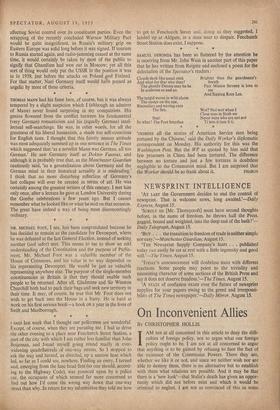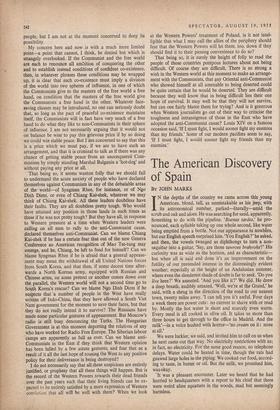On Inconvenient Allies
BYCHRISTOPHER HOLLIS IAM not at all concerned in this article to deny the diffi- culties of foreign policy, nor to argue what our foreign policy ought to be. I am not at all concerned to argue that anything is to be gained by refusing to face the fact of the existence of the Communist Powers. There they are, whether we like it or not, and since we neither wish nor are able to destroy them. there is no alternative bUt to establish with them what relations are possible. And it may be that there is a 'new look'—that Stalin's death has given an oppor- tunity which did not before exist and which it would be criminal to neglect. I am not as convinced of this as some people, but I am not at the moment concerned to deny its possibility.
My concern here and now is with a much more limited point—a point that cannot, I think, be denied but which is strangely overlooked. If the Communist and the free world are each to renounce all ambition of conquering the other and to establish instead conditions of confident co-existence, then, in whatever phrases these conditions may be wrapped up, it is clear that such co-existence must imply a division of the world into two spheres of influence, in one of which the Communists give to the masters of the free world a free hand, on condition that the masters of the free world give the Communists a free hand in the other. Whatever face- saving clauses may be introduced, no one can seriously doubt that, so long as the pact of peaceful co-existence maintains itself, the Communists will in fact have very much of a free hand to do what they like to non-Communists in their sphere of influence. I am not necessarily arguing that it would not on balance be wise to pay this grievous price if by so doing we could win stable peace. But I am concerned to say that this is a price which we must pay, if we are to have such an arrangement, and that it is criminal to talk as if there was any chance of getting stable peace from an unconquered Com- munism by simply standing Marshal Bulganin a 'hot-dog' and without paying any price at all.
That being so, it seems wanton folly that we should fail to understand the acute anxiety of people who have declared themselves against Communism in any of the debatable areas of the world—of Syngman Rhee, for instance, or of Ngo Dinh Diem, or even of Chiang Kai-shek, whatever we may think of Chiang Kai-shek. All these leaders doubtless have their faults. They are all doubtless pretty tough. Who would have attained any position in those lands in such times as these if he was not pretty tough? But they have all, in response to Western pressure at a time when Western leaders were calling on all men to rally to the anti-Communist cause, declared themselves anti-Communist. Can we blame Chiang Kai-shek if he has a certain fear that out of the new Geneva Conference an American recognition of Mao Tse-tung may emerge, and he, Chiang, be left to fend for himself? Can we blame Syngman Rhee if he is afraid that a general appease- ment may mean the withdrawal of all United Nations forces from South Korea, and that then, if some decent time after- wards a North Korean army, equipped with Russian and Chinese arms, on some pretext or another comes down over the parallel, the Western world will not a second time go to South Korea's rescue? Can we blame Ngo Dinh Diem if he suspects that a number of people in the West have really written off Indo-China. that they have allowed a South Viet Nam government for the moment to save their faces, but that they do not really intend it to survive? The Russians have made some particular gestures of appeasement. But Moscow's radio is still busy denouncing the Turks. The Hungarian Government is at this moment deporting the relatives of any who have worked for Radio Free Europe. The Siberian labour camps are apparently as full as ever. Can we blame anti- Communists in the East if they think that Western opinion has been lulled by a few astute gestures, and fear that as a result of it all the last hope of rousing the West to any positive policy for their deliverance is being destroyed?
I do not necessarily say that all these suspicions are entirely justified, or prophesy that all these things will happen. But is the record of the Western Powers towards their dead friends over the past years such that their living friends can be ex- pected to be entirely satisfied by a mere expression of Western conviction that all will be well with them? When we look at the Western Powers' treatment of Poland, is it not intel- ligible that what I may call the allies of the periphery should fear that the Western Powers will let them, too, down if they should find it to their passing convenience to do so?
That being so, it is surely the height of folly to read the people of those countries pompous lectures about not being difficult. Of course they are difficult. There is so strong a wish in the Western world at this moment to make an arrange- ment with the Communists, that any Oriental anti-Communist who showed himself at all amenable to being deserted could be quite certain that he would be deserted. They are difficult because they well know that in being difficult lies their one hope of survival. It may well be that they will not survive, but can one fairly blame them for trying? And is it generous when Western journalists go out of their way to criticise the toughness and intransigence of those in the East who have adopted the anti-Communist cause? Louis XIV on a famous occasion said, 'If 1 must fight, I would sooner fight my enemies than my friends.' Some of our modern pacifists seem to say, `If I must fight, I would sooner fight my friends than my enemies.'



































 Previous page
Previous page